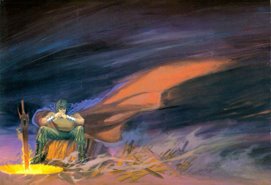The Gospel in Pluralist Society I

Newbigin was born in 1909 into a wealthy Presbyterian family. During schooling years he struggled with doubt and lost his faith. Gifted with a clear, critical mind, he majored in economics and geography at Cambridge.
One night, as he lay in bed, he had a visionary experience of the cross which embraced heaven and earth. This conversion experience left such deep impression on his thought and life direction that he decided to study theology. He became involved in the Student Christian Movement (SCM) where he met his future wife, Helen Henderson, the daughter of a mission worker in India. It was his acquaintance with William Temple which led him to a lifelong passion for the ecumenical movement.
When the time came for him to decide on a career, he set forth for south India in 1936 as a missionary. He immediately sought to learn the Tamil language and understand the culture and religion of India by reading the Svetasvara Upanishad in the original language.
When Lesslie Newbigin returned to the West after 35 years, he took up pastorate at a struggling congregation in Birmingham. To his astonishment, he found native England a hostile mission field. It was during this period that his influential books on the gospel and modernity were written.
As a lifetime cross-cultural missionary, he knew the twin dangers of succumbing to either irrelevance or syncretism. In India, Hindus may worship Jesus on Christmas Day but He is perceived as one among a pantheon of deities. Similarly, in the West, the gospel has been co-opted by the modern dichotomy of ‘public facts’ ascertained by science over against ‘personal values’ speculated by religion. Surrendering the public square, the church has retreated into a private, spiritual ghetto. As part of his legacy, Newbigin challenged the Western church to break away from its cultural captivity to a secular, post-Enlightenment worldview.
The cure, however, is neither a remarriage of church and state vis-à-vis Constantine’s model nor a centralized Sharia regulating all of life. He calls for a ‘committed pluralism’ like the scientific community where each member is free to pursue her research within the tradition of what has been established. When disagreements arise, further experiment and argument are conducted, implying truth can be known. In this model, the church could publicly engage the world without being coercive. Even as violent religious fundamentalism is mounting, genuine unity of humankind can never be achieved through a pluralism that abandons the possibility of knowing the truth, by which alone humankind can be one.








No comments:
Post a Comment